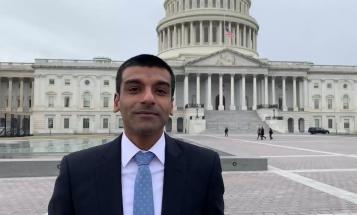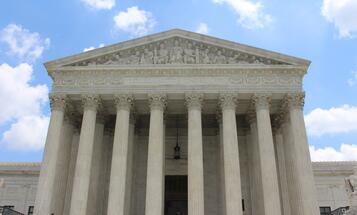
Power and Fairness at the Supreme Court
Yesterday, Demos’ Director of Legal Strategies Chiraag Bains laid out clearly what’s at stake in the coming fight over the new Supreme Court vacancy:
Justice Kennedy’s retirement could not come at a more perilous time for our democracy. This term was a jarring reminder of how much the Supreme Court can impact the daily lives of already marginalized people. The Court weakened civil rights protections in its decisions on voter purges and racial gerrymanders, reproductive rights, the invidious Muslim ban, coercive arbitration clauses in employment contracts, and just today the future of public-sector unions. All of these cases were decided 5-4, with President Trump’s first appointee to the Court in the majority every time.
Another Trump appointee would only continue the assault on our already-troubled democracy and most basic values. None of the nominees on President Trump’s short list have demonstrated the fair-mindedness or independence we need on a Court that must serve as the last line of defense against Trump’s most troubling impulses. As Bains concluded, “[t]he public and our representatives should apply the highest possible scrutiny to any nominee from this president, who consistently threatens the rule of law, is currently under investigation, and deliberately stokes racial fears to divide Americans from each other.”
But before that debate even begins, there’s another matter to consider—the pure Republican power grab that put us in this situation, and the dire consequences of a double standard in nominations to the High Court.
When Justice Antonin Scalia died in 2016, Republican Senate Majority Leader Mitch McConnell refused to even consider any nominee from President Obama in February of an election year. His blockade put Justice Gorsuch on the Court, and was the deciding factor in the Court’s recent rollbacks of voter protections, workers’ rights, reproductive freedom and more.
Now senators must hold President Trump and his allies in the Republican leadership to the standard Sen. McConnell set. They must defer consideration of a nominee until the people have spoken and a new Congress is seated in 2019. This is especially true of Senate Judiciary Committee Chairman Chuck Grassley, who needs to walk back yesterday’s statement about having “precedent” to move forward, given his own role in aiding McConnell’s unprecedented obstruction.
Republicans are welcome to reconsider this standard when the next Democratic president makes a nomination. What they cannot do is steal seats on the Supreme Court by applying one standard to Democratic presidents and another, laxer standard to President Trump. A president under investigation for colluding with an authoritarian regime to achieve power and obstructing justice to cover this up and protect his cronies; a president with his own authoritarian leanings who has shown disturbing contempt for the rule of law.
Rubber-stamping a Trump nominee would only risk adding another narrow-minded elitist to the bench and skew the Court further towards the extreme agenda of the powerful few, and against people of color and working Americans of all races.
With Americans’ fundamental freedoms at stake with this nomination, and palpable energy building for the American people to reject President Trump’s extreme policies and rhetoric at the polls, senators should allow the people’s voices to be heard before considering a Trump nominee.
And, regardless of the process, President Trump should ditch his right-wing-approved short list. We should start fresh in January after the people have spoken.



